Adult Horse Vaccination Guide
Both yearlings and adult horses adhere to the same vaccination schedule. View our guide to learn when to vaccinate.
View Document
In memory of author Mark Crisman, Senior Veterinarian, Zoetis Equine Technical Services
Your fall wellness horse care checklist
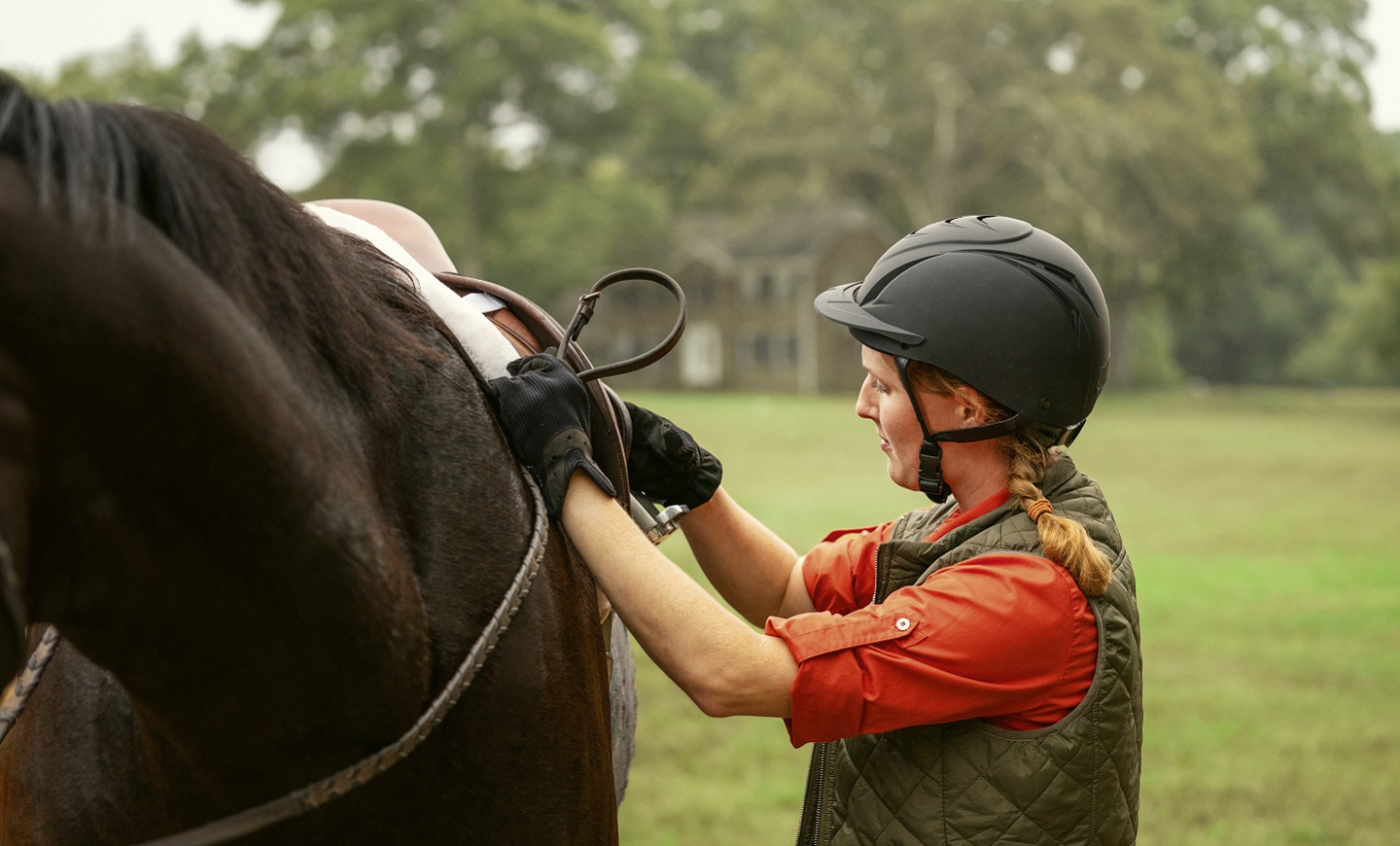


Horses and humans alike welcome crisp fall days after a sizzling hot summer packed with riding activities. So, whether your riding schedule is slowing down or you're preparing for fall championships or a winter show season, now is an excellent time to check your horse’s overall health.
Use this five-point health checklist to help keep your horse feeling their best before the winter months ahead.
All horses, regardless of whether they travel or stay at home, should receive annual core vaccinations against the five potentially fatal diseases—rabies, tetanus, Eastern equine encephalomyelitis, Western equine encephalomyelitis and West Nile virus. Competitive horses or those hauled frequently may require both spring and fall vaccination visits. Core vaccines are typically given in the spring before the start of an active riding season, but if your horse isn't vaccinated by a veterinarian, take advantage of fall to check it off the to-do list.
Protect your horse against the five core diseases above with a simple and streamlined dose of Core EQ Innovator®. It’s the first and only vaccine approved by the U.S. Department of Agriculture that includes all five core equine disease antigens in a single 1 mL dose.
Vaccinations for all species (including us!) need a short window of time to build up defenses for complete protection. This is especially important for horses that travel. Schedule vaccination appointments with your veterinarian at least two weeks prior to trips in order to reduce stress and ensure that your horse has optimal protection against infectious diseases.
It takes a minimum of 14 days for a vaccine to elicit the optimal immune response in your horse.
Fall is also a good time to vaccinate your horse against equine influenza (flu) and equine herpes virus (rhino). These are the most common respiratory issues in horses that can even infect horses that don't travel if they were exposed to infected horses and living on a shared property. At your next appointment, ask your veterinarian if your horse needs additional risk-based vaccines for diseases such as strangles, botulism, leptospirosis or Potomac horse fever.
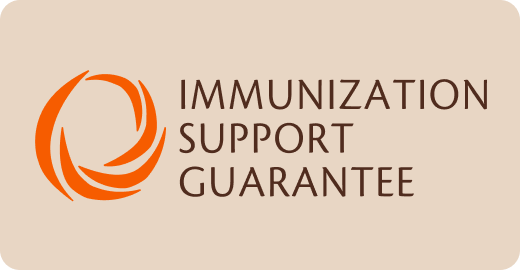
The benefit of having Zoetis Equine vaccines administered by your veterinarian is that your horse is covered by the Zoetis Equine Immunization Support Guarantee. In a nutshell, this guarantee covers reasonable diagnostic and treatment costs up to $5,000 if a horse is properly vaccinated by a veterinarian with a Zoetis antigen and contracts the corresponding equine disease.
While your veterinarian is out giving the appropriate vaccines, have them collect a small amount of manure to run a fecal egg count test. Based on the results, your veterinarian will recommend a deworming protocol that matches your horse’s individual needs and living environment to help avoid parasite resistance while supporting your horse’s health.
Treatment for tapeworms is recommended in late fall or early winter to align with a tapeworm’s transmission cycle. One dose of Quest® Plus Gel (moxidectin/praziquantel) treats and controls tapeworms, adult small strongyles, encysted small strongyle larvae, large strongyles, bots, pinworms and hairworms.
Dental and oral health is also critical to your horse’s overall well-being—from digesting and absorbing feed nutrients to reducing the risk of choking to carrying a bit without discomfort and much more. In fact, a 2019 research study found that dental pain from an infected cheek tooth was correlated with many common horse “behavior problems,” including inconsistent left to right rein contact, evading the bit and head shyness.1
Fall can also be the ideal time for a veterinarian to evaluate your horse’s teeth, even though many veterinarians usually perform dental exams during spring wellness visits. During an exam, your veterinarian will evaluate your horse’s whole mouth and check for tooth-imbalanced wear such as hooks, ramps or waves that may interfere with proper chewing. Some horses—especially seniors—may need more frequent visits, while others only need an annual exam.
For more in-depth information on this topic, check out the blogs, “Can You Spot the Signs of Dental Pain in Your Horse?” and “What to Expect During Equine Dental Exams” on zoetisequine.com.
Chances are your dog’s or cat’s veterinarian recommends annual bloodwork to establish baseline levels and monitor for changes. While most horses receive an annual Coggins test to screen for equine infectious anemia, many horse owners don’t know they can also ask their equine veterinarian to conduct additional bloodwork to proactively watch for other health challenges, including thyroid, metabolic or endocrine conditions such as pituitary pars intermedia dysfunction (also known as Cushing’s disease).
To check your horse for possible subclinical infection during their fall wellness exam, your veterinarian can take a small blood sample and test it with the stall-side Stablelab® EQ-1 Handheld Reader. This fast-tracking veterinary tool tells veterinarians if your horse is battling an infection in as little as 10 minutes—quick enough for you to learn more information in-person during the check-up visit.2
Let’s face it, summer can be hectic. It’s easy to use up basic horse care supplies and forget to replenish them. Having a fully stocked first aid kit means you can “grab and go” in an emergency. As summer comes to a close, be sure to restock your first aid supplies as well as discard any expired products. Update your first aid kit this fall with these key items so it’s ready to use:
Horse owners know that when their horses recognize care and dedication, they return it tenfold. Carving out space and time for routine fall wellness check-ups paves the way for greater peace of mind and proactive due diligence this season and into the next.
IMPORTANT SAFETY INFORMATION
Dormosedan Gel
Do not use DORMOSEDAN GEL in horses with pre-existing atrioventricular (AV) or sinoatrial (SA) block, with severe coronary insufficiency, cerebrovascular disease, respiratory disease, or chronic renal failure. Do not use in anesthetized or sedated horses, or in conditions of shock, severe debilitation or stress due to extreme heat, cold, fatigue or high altitude. Do not use in horses intended for human consumption. Handle gel-dosing syringes with caution to avoid direct exposure to skin, eyes or mouth. See full Prescribing Information.
Quest Gel & Quest Plus Gel
Do not use Quest Gel or Quest Plus Gel in foals less than 6 months of age or in sick, debilitated and underweight horses. Do not use these products in other animal species, as severe adverse reactions, including fatalities in dogs, may result. Consult your veterinarian for assistance in the diagnosis, treatment, and control of parasitism.
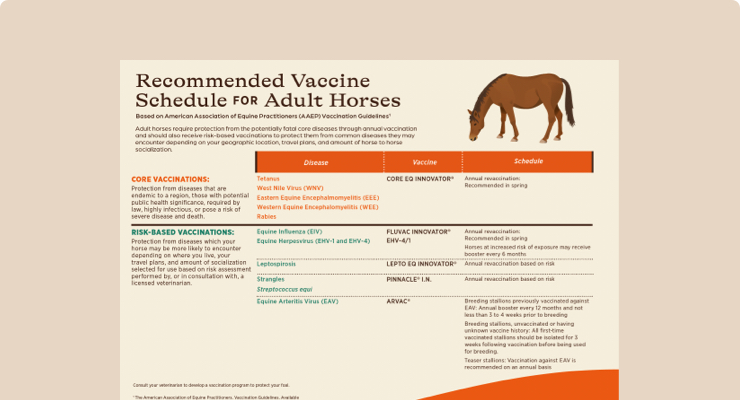
Both yearlings and adult horses adhere to the same vaccination schedule. View our guide to learn when to vaccinate.
View Document
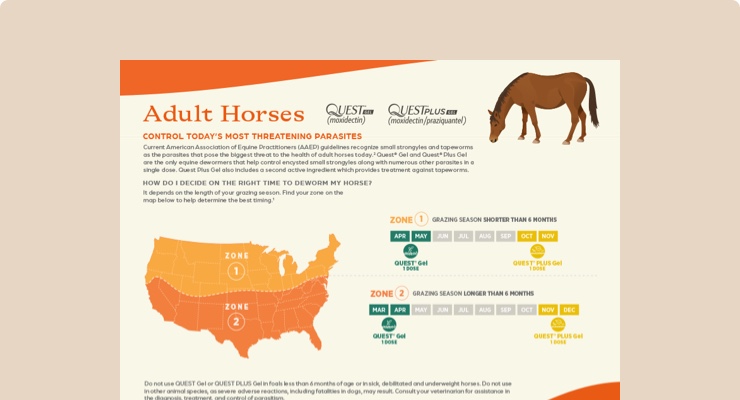
Our adult horse guide includes recommendations for broodmares along with low and high shedders.
View Document
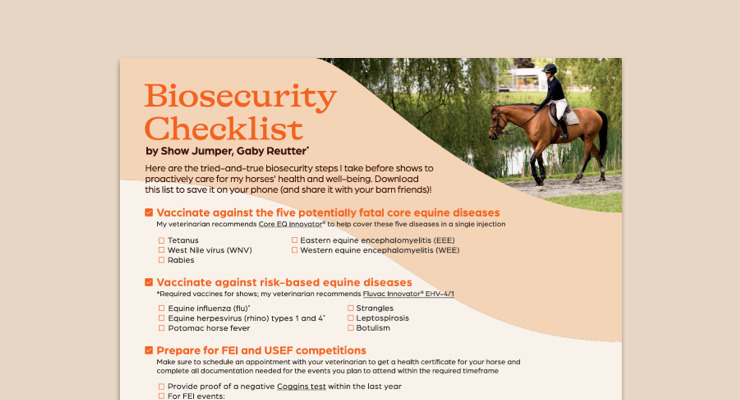
Peek behind the curtain to see how Gaby Reutter partners with her veterinarian to ensure her horses stay in top health before, during and after competitions. Download the biosecurity checklist to learn more.
View Document

A comprehensive guide to the only FDA-approved oral sedative designed specifically for horses.
View Document
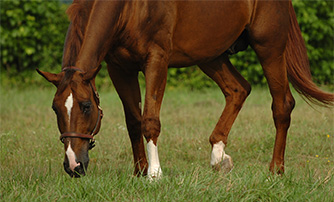
Read Article
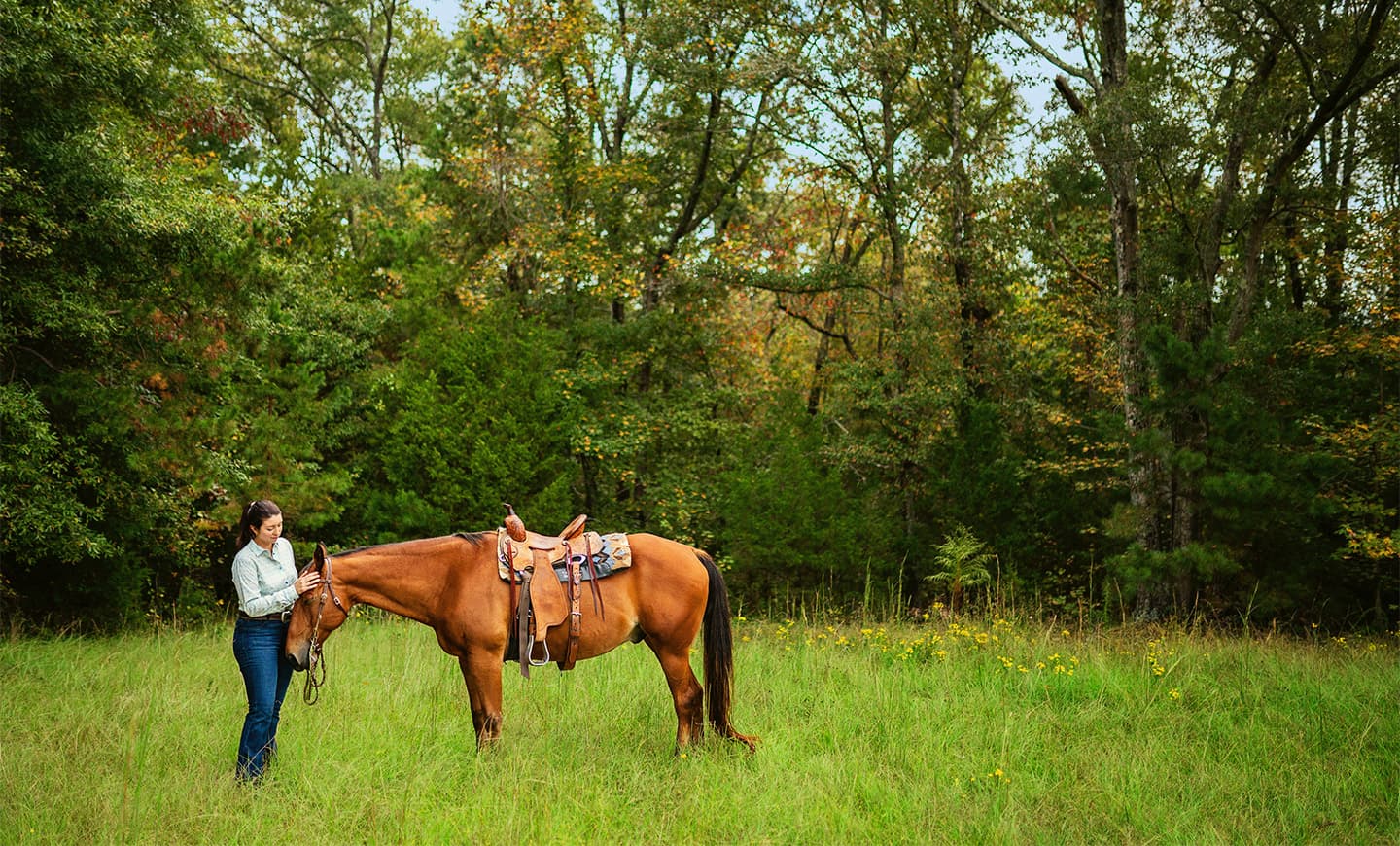
Read Article
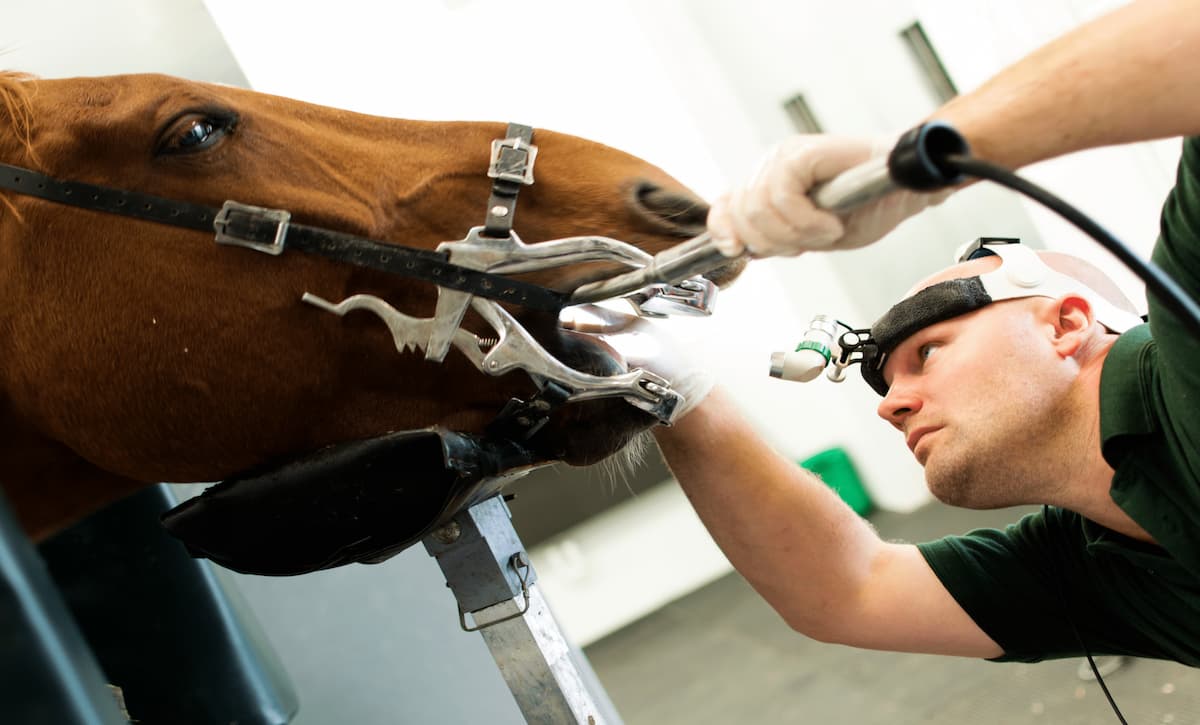
Read Article
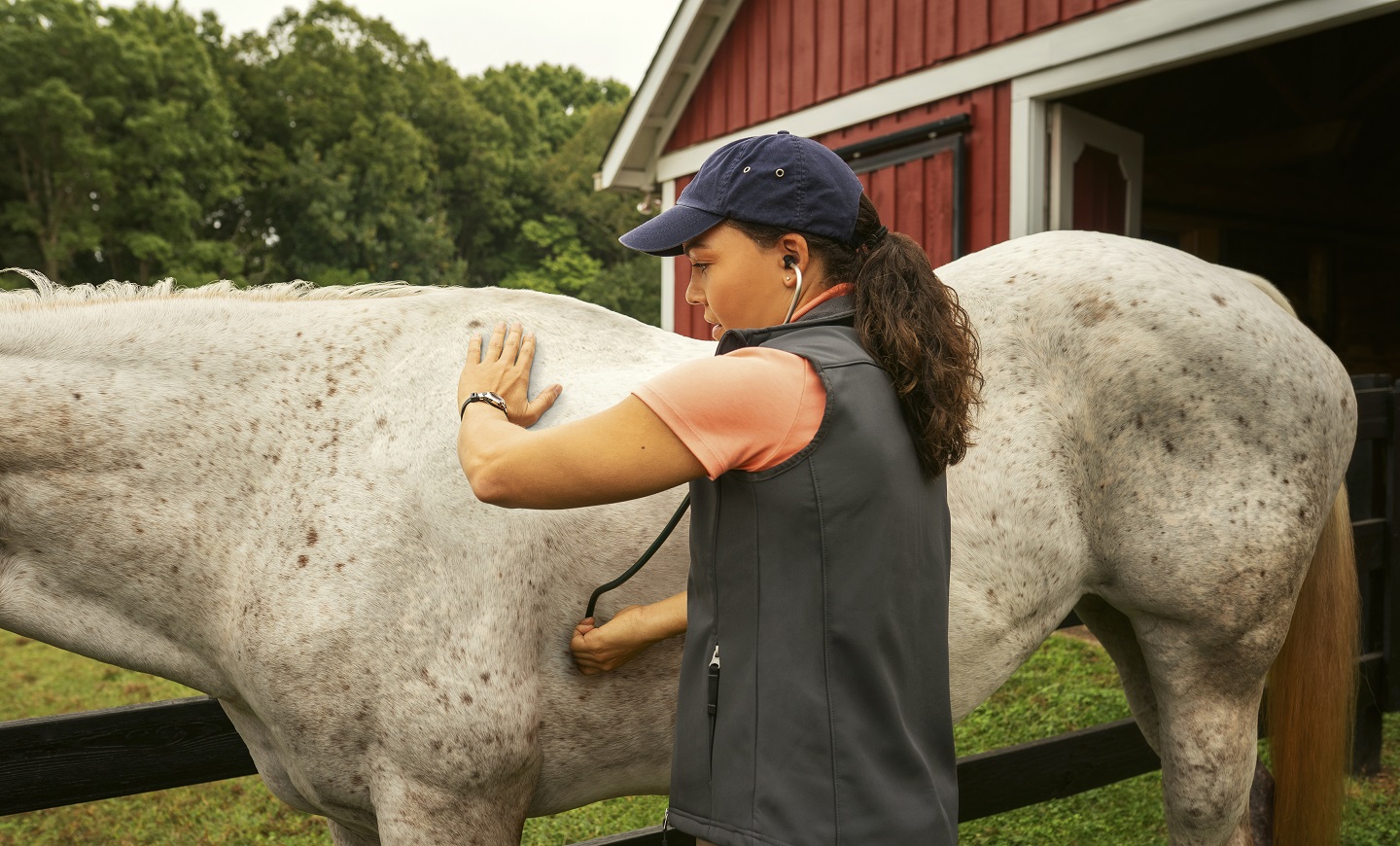
Read Article
References
All trademarks are the property of Zoetis Services LLC or a related company or a licensor unless otherwise noted. Dormosedan is a registered trademark of Orion Corporate, distributed by Zoetis under license. Stablelab is a registered trademark of Epona Biotech Limited, used under license.
© 2025 Zoetis Services LLC. All rights reserved. COR-00208R1